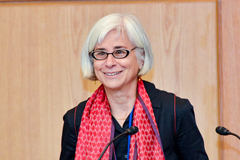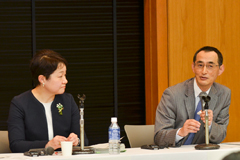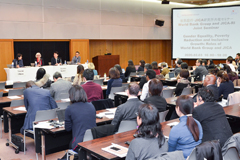‘Gender Equality, Poverty Reduction and Inclusive Growth’ — A Seminar Jointly Hosted with the World Bank
2020.02.26
The World Bank Group and the JICA Research Institute (JICA-RI) jointly hosted a seminar “Gender Equality, Poverty Reduction and Inclusive Growth: Roles of World Bank Group and JICA,” at the JICA Ichigaya Building on Feb. 3, 2020.
Caren Grown, the World Bank’s Gender Group senior director, during her keynote speech, said, “I just want to remind us all that gender equality is a whole of society issue. It's an issue that is not about women and not just for women. It's an issue about children, it’s an issue that involves men, and then changes male behavior and male norms. It’s an issue for societies. It’s an issue for whole countries. So this is not a small niche issue but one that is actually at the center of everything we think about.” She described the current state of the world, saying while significant progress has been made in the domain of maternal and reproductive health over the last two decades, huge economic cost has been incurred as a result of gender inequality. Then she introduced the World Bank Group’s gender strategy, consisting of the four pillars: (1) improving human endowments (health, education and social protection), (2) removing constraints for more and better jobs, (3) removing barriers to women’s ownership and control of assets and (4) enhancing women’s voice and agency and engaging men and boys.

Caren Grown, the World Bank’s Gender Group senior director, gave her keynote speech
Grown also pointed out that we have not seen the gender gap improvement that was expected to result from the Beijing Declaration and the Platform for Action, adopted at the 1995 Fourth World Conference on Women in Beijing. She emphasized that the World Bank Group decided to abandon the generic gender mainstreaming and move toward a targeted problem-solving approach or an approach that closes the most serious gaps between men and women. Accordingly, she explained, the World Bank supports gender equality by promoting the employment of women through the development of public transportation services that are safe to use, promoting female entrepreneurs through digital financial services and improving access to financial services, and enhancing women’s voice through the creation of norms that combat gender-based violence and gender discrimination.
Lastly, she concluded by saying “I mentioned that is not mainstreaming, but it’s about taking a problem-solving human-centered design, behavioral science approach to changing behavior. We feel that if we can change not only the enabling environment, but also social norms and the unconscious bias that we all live with, we will have a higher probability of getting results. But we cannot do this alone. We need partners. And it’s really important for us to have partners like JICA, like countries, to do this with us, and we really care about learning together, experimenting together, and making progress together.”
Kamei Haruko, senior director of JICA’s Office for Gender Equality and Poverty Reduction, Infrastructure and Peace Building Department, and Yamagata Tatsufumi, a professor at Ritsumeikan Asia Pacific University, presented their own comments after Grown’s speech.
Kamei said that “gender equality is unfinished business,” and that at the current pace, it would take 202 years to solve gender inequality according to the 2018 Global Gender Gap Report by the World Economic Forum. She said we need to accelerate the progress toward the achievement of the Sustainable Development Goals (SDGs). She also explained that in JICA’s mid-term plan, JICA had set a minimum target of 40% on a budgetary basis to be categorized as gender-mainstreamed projects. Specific project examples included support for female entrepreneurs in Ethiopia through joint financing with the World Bank, a Delhi Metro construction project in India that takes female needs into consideration and the Project on Anti-Trafficking in Persons in Southeast Asia.

Kamei Haruko, JICA (left), and Yamagata Tatsufumi, Ritsumeikan Asia Pacific University
Yamagata, who is involved in the Ministry of Foreign Affairs’ ODA Evaluation Project "Japan's ODA for Empowerment of Women", said, “Some people say poverty reduction is a problem that has already been solved, but as noted by ‘World Development Report 2012’, the gender gap and other disparities remain as unsolved as ever. The gender field is in need of a flagship program for women’s empowerment developed in Japan, just as kaizen has done for industry and the Maternal and Child Health Handbook has done for health.”
In the following panel discussion, JICA-RI Director Ohno Izumi, who was serving as moderator, asked the question what role Japan can play, considering its poor performance on the Gender Gap Index. Kamei replied, saying that precisely because of its strict gender norms, Japan has much to contribute through its unique experience and lessons, with one example being women-only train cars. Grown, who was asked for advice on JICA, said that mainstreaming can be very helpful as a first step but what is really important is to get to a results-based framework and then to have indicators that actually help you measure the progress towards that results.

JICA-RI Director Ohno Izumi served as moderator for the panel discussion
Opinions and questions from a variety of perspectives were raised by the audience, and lively discussions took place.

事業事前評価表(地球規模課題対応国際科学技術協力(SATREPS)).国際協力機構 地球環境部 . 防災第一チーム. 1.案件名.国 名: フィリピン共和国.

事業事前評価表(地球規模課題対応国際科学技術協力(SATREPS)).国際協力機構 地球環境部 . 防災第一チーム. 1.案件名.国 名: フィリピン共和国.

事業事前評価表(地球規模課題対応国際科学技術協力(SATREPS)).国際協力機構 地球環境部 . 防災第一チーム. 1.案件名.国 名: フィリピン共和国.

事業事前評価表(地球規模課題対応国際科学技術協力(SATREPS)).国際協力機構 地球環境部 . 防災第一チーム. 1.案件名.国 名: フィリピン共和国.

事業事前評価表(地球規模課題対応国際科学技術協力(SATREPS)).国際協力機構 地球環境部 . 防災第一チーム. 1.案件名.国 名: フィリピン共和国.
scroll